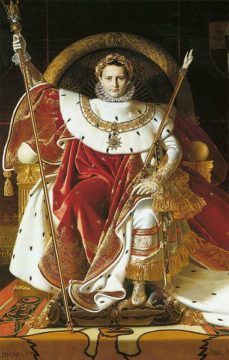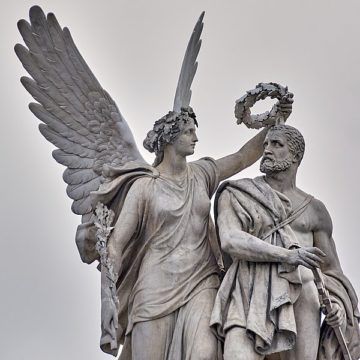by Chris Horner
 This year marks the 200th anniversary of Napoleon Bonaparte’s death in exile on the island of St Helena. And it was 206 years ago last June that his career came to a bloody end at Waterloo, with defeat at the hands of an allied army led by Britain’s Wellington and Prussia’s Blucher. But while the Emperor himself is dead and gone, the Napoleon Myth marches on, and is celebrated in some unlikely quarters.
This year marks the 200th anniversary of Napoleon Bonaparte’s death in exile on the island of St Helena. And it was 206 years ago last June that his career came to a bloody end at Waterloo, with defeat at the hands of an allied army led by Britain’s Wellington and Prussia’s Blucher. But while the Emperor himself is dead and gone, the Napoleon Myth marches on, and is celebrated in some unlikely quarters.
The Guardian’s Martin Kettle is a big fan of the Emperor, as is the historian Andrew Roberts. Both have written admiringly on the man, the former in the pages of his newspaper, the latter in a big biography that verges on hagiography. On the face of it this is odd – Kettle is a liberal and Roberts is a conservative. What could they both find in the life of the ‘Disturber of the Peace of Europe’ to admire? They are not first to mourn the fall of Napoleon and sympathise with those who saw him as a great bulwark against reaction, but just the latest in a long line of Bonaparte fans. I’m not inclined share their adoration of the Corsican Adventurer.
It is certainly true that an appalling set of Crowned Heads did well out of the fall of the Emperor: after 1815 they imposed reactionary regimes across the content of Europe, which lasted until at least 1848. And in Britain the period fallowing the wars was one of great suffering and repression, a veritable ‘Thanatocracy’ in which armed force and the noose secured the rule of the rich. It is understandable that any radicals of the day tended to see Napoleon as a great alternative to the tyranny of the Monarchs who fought him: the essayist Hazlitt kept a bust of Napoleon on his desk, Byron publicly regretted the result at Waterloo, and later Victor Hugo devoted a large section of Les Miserables to mourning the fall of the Emperor in 1815. They saw him as carrying the spirit of the great Revolution of 1789 forward, and wished he had prevailed on the field of battle. Read more »

